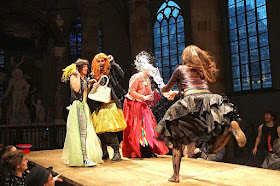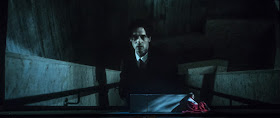 |
| Ambroise Thomas: Hamlet - Quirijn de Lang, Martina Prins - Opera2Day (Photo Ben van Duin) |
Founded in 2007 the company is interested in both opera and music theatre, with a very psychological approach to presentation, with recent work including immersive music theatre and site-specific pieces. For Serge, there are two distinct ways an opera company can function today. Either you produce work of integrity and then try and sell it to the public, or you have to adopt the lowest common denominator approach and sell your soul. Opera2Day tries to forge a middle way, producing work they believe in but taking into account the environments in which they have to perform, producing work for the audiences of today including the younger generation.
 |
| Opera2Day - A Madhouse Fair (Photo Roelof Pothuis) |
With this year's production of Hamlet, there were both dramatic and economic reasons to create a new version of the opera. Serge felt that so much of the piece was grand opera which did not tell Hamlet's story, and the company explored how to make opera today both practical and something which makes dramatic sense. They used an edited version, shorter in duration with an instrumental ensemble of 16 and the choruses sung by the male soloists plus three female ensemble singers.
There were a number of reasons why Hamlet was chosen. Seeing the play was one of the reasons why the teenage Serge fell for the theatre, and he wanted to do a version of the opera which bought Shakespeare's text back. But also the Theatre Francais de la Haye was an inspiration. Between 1804 and 1919 this company performed opera at what is now the Koninklijke Schouwberg in The Hague. This was a French opera house partly because the Dutch court spoke French, and it performed Hamlet 53 times, some performances with a pupil of Jean-Baptiste Faure the first Hamlet. Opera2Day feels they are heirs to this tradition and have access to a huge archive of scores and parts from the period. Having performed Cherubini's Medee in 2014, Hamlet further acknowledged this French tradition.
But the company has a third perspective on the opera, that of performance practice. The Hague was an important centre for the Early Music movement in the 1970s and remains a centre of study. Hernán Schvartzman, the conductor of Hamlet, came from Argentina to study Early Music in The Hague. Emlyn Stam, the artistic coordinator of the New European Ensemble, is doing a PhD in the performance practice in the early modern period, the first singers that we can hear on disc. And it was these singers and their performance practice, portamenti and all, which informed the productions of Dr Miracle and Hamlet.
 |
| Opera2Day - La troupe d'Orphee (photo Hans Oostrum) |
There are no recordings of Jean-Baptise Faure as Hamlet but we have recordings of him in other roles. And there are recordings of Nellie Melba as Ophelie [see on YouTube], and she was Ambroise Thomas' favourite singer in the role. These provide a different perspective on the way to perform the music. An approach which Serge calls Historically Inspired Performance Practice.
The company gives around 40 performances per year. Hamlet is being given 25 times across 20 cities. The company's venues are generally spoken word theatres. The Koninklijke Schouwberg is now the home of the Dutch National Theatre and has an acoustic far drier than in the days of the Theatre Francais de la Haye and the company's other venues are similar. So they used what they call acousticisation, using amplification to give added acoustic reverberation to the performance.
In an ideal world, the process should not be noticeable but Hamlet is a far bigger staging than some of the company's other productions, more complex with off-stage elements and many stage settings. So, Serge van Veggel admits that it was a work in progress, 75% of the time you did not notice, but 25% of the time you did.
 |
| Ambroise Thomas: Hamlet - Quirijn de Lang - Opera2Day (Photo Ben van Duin) |
Since 2013 the company has involved students and amateur performers in their projects. For Cherubini's Medee they had 150 at each performance playing the crowd. But for each project, the type of involvement is different. So for Hamlet singers and a local brass band perform music for Hamlet senior's funeral in the foyer before the performance. This type of involvement is a big project, working with different groups in each location, but also very rewarding. Serge points out that for the present younger generation, even their parents do not listen to classical music. So such a project can show young people how such events can touch all the senses, and they have managed to get some strong positive reactions from participants in the projects.
Elsewhere on this blog:
- Transcendent mysticism: Vaughan Williams' Mass from St John's College (★★★★★) - CD review
- Te Deum: Purcell & Charpentier at Westminster Abbey for London Festival of Baroque Music (★★★★) - Concert review
- All-star Orfeo - Iestyn Davies and Sophie Bevan at the London Festival of Baroque Music (★★★★) - Concert review
- Sonorous debut: Neil Ferris & Sonoro in Frank Martin & James MacMillan (★★★★) - CD review
- Gilbert & Cellier: A work of real musical personality, The Mountebanks rediscovered (★★★★) - CD review
- Vivica Genaux & Sonia Prina recreate the music sung by two great castratos at the Wigmore Hall (★★★★) - concert review
- The story of a journey: Roderick Williams & Christopher Glynn in Schubert's Winter Journey (★★★★★) - CD review
- Welcome to the Magical Garden or perhaps the Garden of Magic: the piano music of Robert Saxton (★★★★) - CD review
- Philip Venables' 4:48 Psychosis returns (★★★★) - Opera review
- Thrilling revival: Shostakovich's Lady Macbeth of Mtsensk at Covent Garden (★★★★★) - Opera review
- Striking double in Clapham: Shadwell Opera debuts a new work with powerful Janacek song-cycle (★★★½) - opera review
- Music from Handel's London Theatre Orchestra (★★★★) - CD review
- Passio: from Tallis & Purcell to Kevin Hartnett via Bach (★★★) - CD review
- Out of the parlour and into the recital room - Hubert Parry's English lyrics (★★★★) - CD review
- Beethoven unbound and Schubert cycles, I chat to Welsh pianist Llŷr Williams - interview
- Home

No comments:
Post a Comment